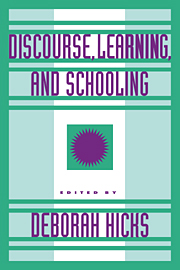Book contents
- Frontmatter
- Contents
- List of Contributors
- Acknowledgments
- 1 Introduction
- Part I Classroom discourses
- 2 Going for the zone: the social and cognitive ecology of teacher–student interaction in classroom conversations
- 3 Shifting participant frameworks: orchestrating thinking practices in group discussion
- 4 Contextual inquiries: a discourse-oriented study of classroom learning
- Part II Literacy, psychology, and pedagogy
- Part III Discourse and literacies
- Afterword
- Index
3 - Shifting participant frameworks: orchestrating thinking practices in group discussion
Published online by Cambridge University Press: 03 May 2010
- Frontmatter
- Contents
- List of Contributors
- Acknowledgments
- 1 Introduction
- Part I Classroom discourses
- 2 Going for the zone: the social and cognitive ecology of teacher–student interaction in classroom conversations
- 3 Shifting participant frameworks: orchestrating thinking practices in group discussion
- 4 Contextual inquiries: a discourse-oriented study of classroom learning
- Part II Literacy, psychology, and pedagogy
- Part III Discourse and literacies
- Afterword
- Index
Summary
Steven: I think that I don't agree with Janette's idea that we don't need to use Paulina's concentrate value, because I think it would be unfair to just not use Paulina's concentrate … if you make a concentrate over with different amounts of lemon juice and sugar, then it'll just be a totally different concentrate, like Ted said. …
Introduction
Ethnographic studies of social interaction and everyday cognition amply demonstrate that children are capable of complex and abstract reasoning in their everyday, out-of-school activities (Bloome & Horowitz, 1991; Cook-Gumperz, 1986; Goodwin, 1990; Heath, 1983; Rogoff & Lave, 1984; Saxe, 1988). But how do children come to take on the particular roles and discourse forms that are valued in problem posing and problem solving in school? Although children do bring their out-of-school reasoning abilities into the classroom, this thinking is often not taken up and developed as part of the classroom work unless children can display it in ways that teachers recognize (Michaels, O'Connor, & Richards, 1993).
How do students come to appropriate and publicly communicate with the forms of talk or text that are part of being a competent hypothesizes evidence provider, maker of distinctions, checker of facts? For some children these discursive practices never become natural, yet for others they seem to fit from the first day of school. Research suggests that language socialization patterns in the home provide a basis for some of these roles and actions (Heath, 1983; Ochs, Taylor, Rudolph, & Smith, 1991).
- Type
- Chapter
- Information
- Discourse, Learning, and Schooling , pp. 63 - 103Publisher: Cambridge University PressPrint publication year: 1996
- 227
- Cited by

